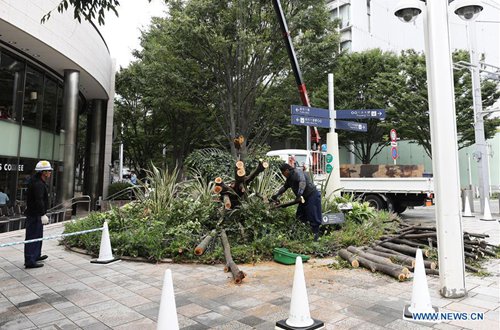HOME >> WORLD
Typhoon Faxai kills 3 in Tokyo metropolitan area
Source:Xinhua Published: 2019/9/10 9:57:03

Staff members clear the broken trees caused by typhoon Faxai in Tokyo, Japan, Sept. 9, 2019. Typhoon Faxai made landfall near Tokyo early Monday morning causing major disruption to transportation networks with train services being suspended and flights being halted as the capital and surrounded areas were lashed by torrential rain and battered by gusty winds. (Photo: Xinhua)
Typhoon Faxai, which made landfall near Tokyo early Monday morning, left at least three people dead in its wake and around 40 others injured as it battered the capital and surrounding areas on its way northward to the Pacific.
The powerful typhoon wreaked havoc on the Tokyo metropolitan area after making landfall near Chiba City, east of Tokyo, at around 5 a.m. local time, causing major disruption to transportation networks with train services being suspended and flights being halted as the capital and surrounding areas were lashed by torrential rain and battered by gusty winds.
Local officials said a woman in her 50s in Tokyo's Setagaya Ward was killed after she was knocked off her feet by a powerful gust of wind and blown into a wall. A man in his late 80s was also killed after a tree was blown over on him in Otaki, Chiba Prefecture.
A woman in her 20s, meanwhile, was left seriously injured after a fence surrounding a golf driving range in Ichihara, Chiba, collapsed on homes as a result of the typhoon.
East Japan Railway Co. was forced to suspend all lines in the greater Tokyo area, disrupting commutes during rush hour for more than one million passengers on the first day of the week, although the majority of services restarted from midday.
Central Japan Railway Co. resumed its bullet train services at around 7:40 a.m. after debris was removed from tracks. Preempting the severity of the storm, the operator had reduced its services between Tokyo and Shin-Osaka a day earlier.
Around 930,000 households in the prefectures of Chiba and Kanagawa were temporarily left without power, according to Tokyo Electric Power Company, while the Japan Atomic Energy Agency said a disused cooling tower at a facility in Ibaraki Prefecture collapsed in the morning, although no radioactive materials were dispersed.
In addition, Japan's nuclear watchdog said that seven monitoring posts in Chiba Prefecture had not sent data regarding radiation levels, with the malfunction occurring since early Monday morning.
The Nuclear Regulation Authority confirmed, however, that alternative monitoring posts had not detected any change in the levels of radiation.
Around 138 flights to and from Tokyo area airports were cancelled, including 49 Japan Airlines flights and 41 operated by All Nippon Airways, the carriers said earlier Monday. The other cancellations were made by smaller, budget carriers.
Faxai, the season's 15th typhoon and the ninth to make landfall in Chiba since record keeping began, dumped more than 440 mm of rainfall on the city of Izu in Shizuoka Prefecture, with 109.0 mm of rainfall logged in a single hour early in the morning, the weather agency said.
The typhoon was was traveling in northeasterly trajectory at 30 km per hour off Sanriku in northeastern Japan, according to the latest reports.
Its atmospheric pressure had intensified to 975 hectopascals at its center and winds of up to 180 kph have been clocked, the weather agency said, adding that it will likely bring 80 mm of rainfall to the Tohoku region in Japan's northeast in the 24 hours through midday on Tuesday.
Posted in: ASIA-PACIFIC